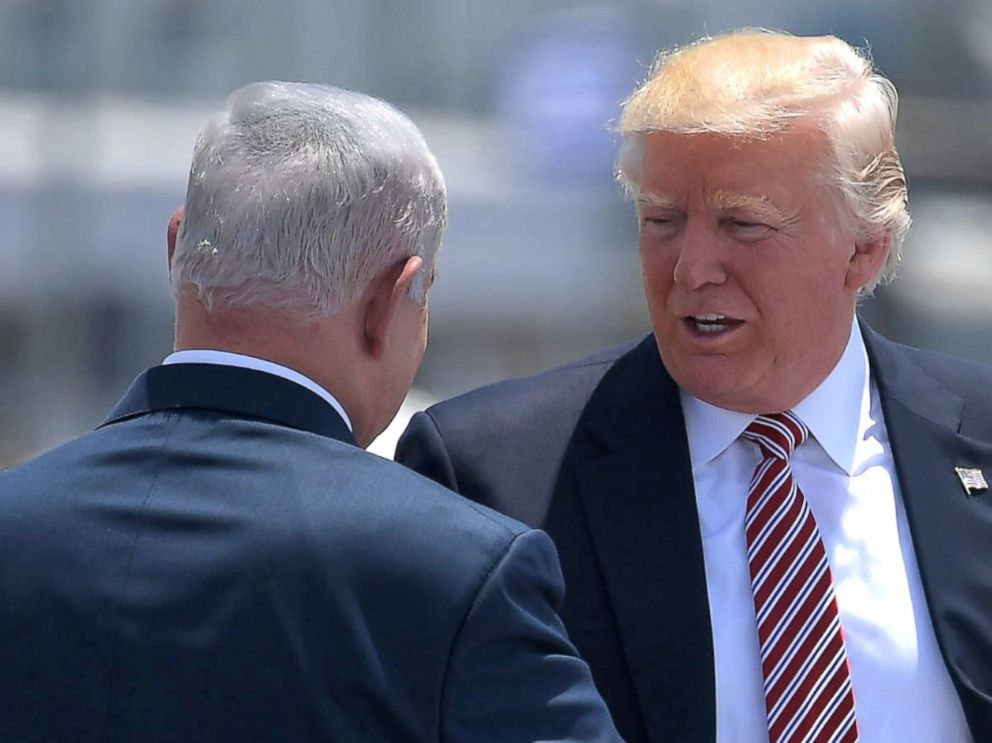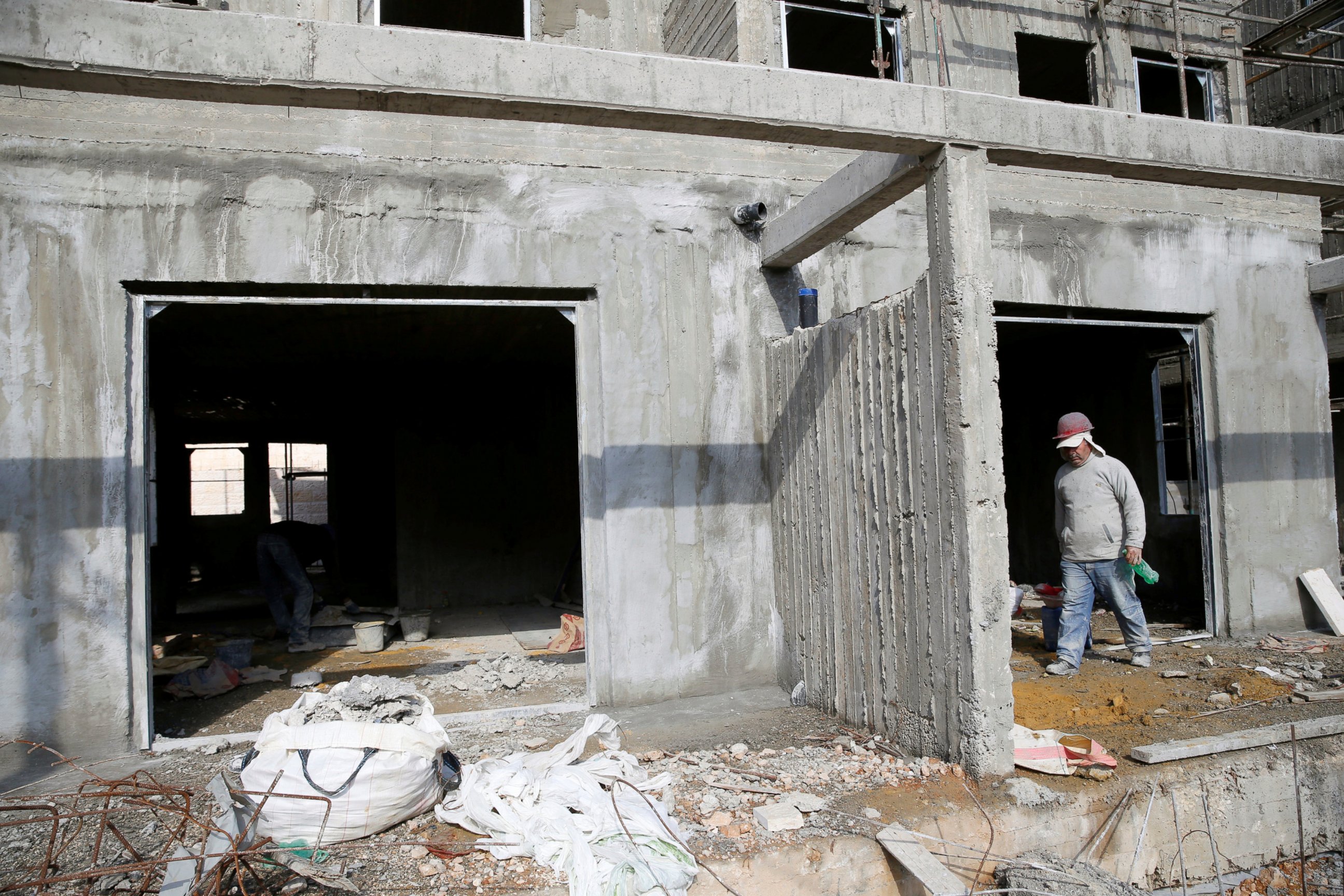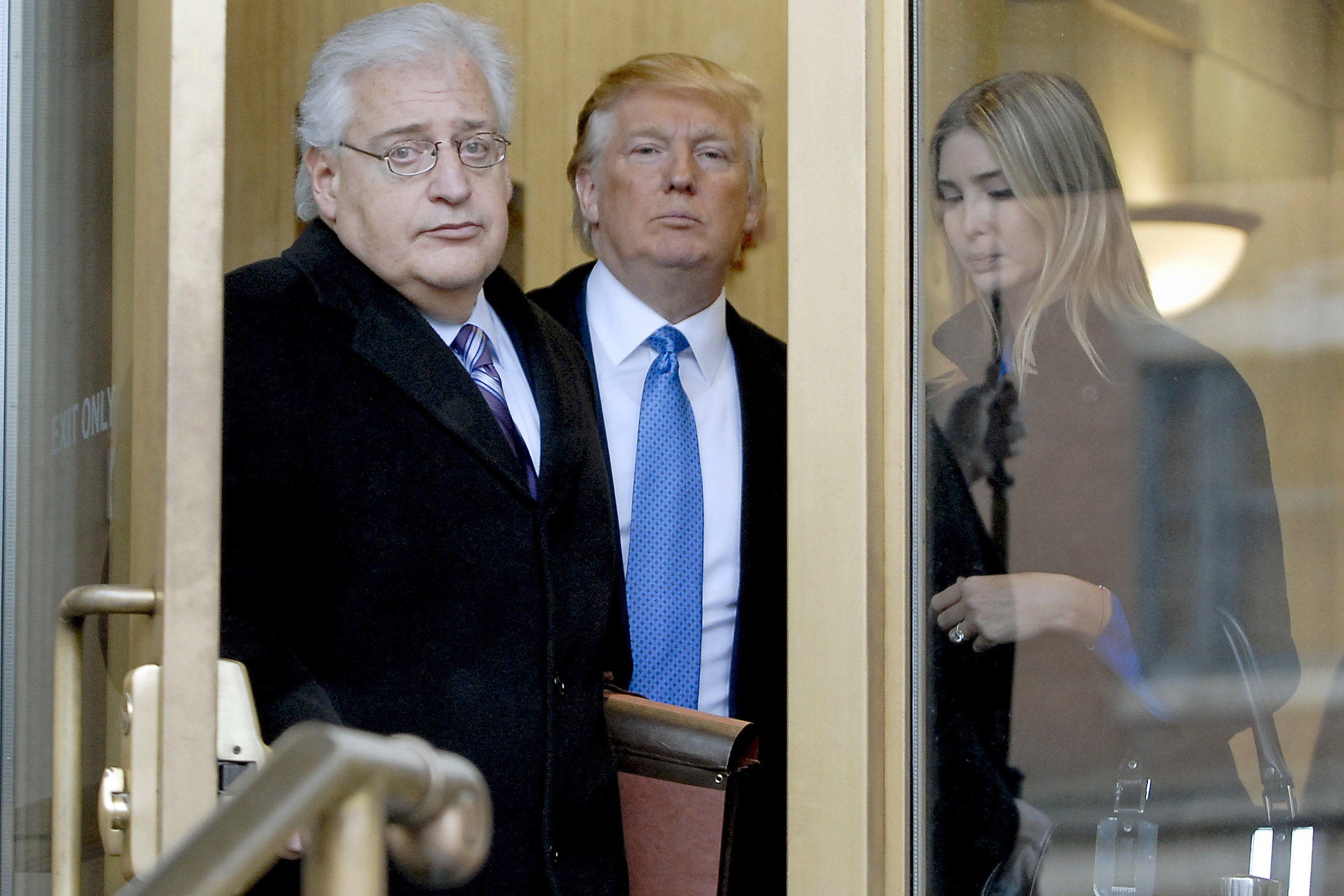Behind the controversial practice of building Israeli settlements
The president is meeting with Israeli leaders this week.
— -- President Donald Trump was greeted by Israeli Prime Minister Benjamin Netanyahu when he arrived in Tel Aviv this morning, the second stop on Trump's first foreign trip.
"We have before us a rare opportunity to bring security and stability and peace to this region and to its people, defeating terrorism and creating a future of harmony, prosperity and peace. But we can only get there working together,” Trump said on the tarmac of Tel Aviv’s Ben Gurion Airport upon his arrival.
At the top of the president’s agenda will be laying the groundwork for a peace process between Israel and the Palestinians. He will meet with both Netanyahu and Palestinian Authority President Mahmoud Abbas, though a senior White House official said the president does not expect to convene a joint meeting between the two leaders on this trip.
One of the biggest sticking points in any deal are Israeli settlements -- communities of Israeli citizens, ethnically Jewish, in the Occupied West Bank, including East Jerusalem, and in the Golan Heights.
While the Israeli settlement issue would be just one piece of a two-state solution framework, it is a critical obstacle to peace. ABC News breaks down what you need to know about Israeli settlements.
What are Israeli settlements?
Israeli settlements range from small outposts and villages to cities with tens of thousands of residents.
The territories have been occupied by Israel since the 1967 Six-Day War — when Israel, feeling that its security was threatened by its Arab neighbors, captured those areas from Jordan and Syria, respectively, and the Gaza Strip and the Sinai Peninsula from Egypt. (The boundary between Israel and the West Bank is often referred to as the 1967 line and is viewed as a possible border between Israel and a future Palestinian state if the parties pursue a two-state solution.)
Originally, Israeli settlements were in all the captured areas, but Israel evacuated the settlements from the Sinai Peninsula in 1979 after a peace agreement with Egypt and from the Gaza Strip in 2005 after a proposal by Israel’s then–Prime Minister Ariel Sharon that was meant to move forward the Israeli-Palestinian peace process.

In December, former Secretary of State John Kerry said there were 130 Israeli settlements east of the 1967 line. One hundred thousand settlers have moved into occupied territory since 2009.
Nearly 90,000 settlers live east of the separation barrier, a wall built by Israel because of security concerns during the second intifada starting in 2000.
At the end of 2015, the Israeli Interior Ministry said nearly 400,000 Jews live in the West Bank, including those beyond the separation barrier but not counting those in East Jerusalem. It is estimated that more than 300,000 Jews live in East Jerusalem, which contains some of the holiest sites for Christians, Jews and Muslims. (In comparison, about 2.75 million Palestinians live under Israeli military occupation in the West Bank, including East Jerusalem.)
At the end of last year, Israel announced that it would build 5,600 homes in East Jerusalem.
Why do Israeli settlements cause controversy?
Israelis advocate for and defend settlement construction for various historical, religious, political and security reasons.
But the United Nations considers Israeli settlements illegal under international law, in part because they violate several Security Council resolutions.
Israel argues that settlements are legal because the 1949 Fourth Geneva Convention, which defines humanitarian protections for civilians in war zones and which Israel signed, does not apply to the territories seized in the 1967 war. However, most international institutions — such as the International Court of Justice and the U.N. Security Council and General Assembly — say the Fourth Geneva Convention applies to those territories.
In December, the U.S. abstained from a U.N. vote condemning Israeli settlements. (Traditionally, the U.S. has vetoed Security Council resolutions that condemned settlements.)

Kerry had defended the U.S. decision at the time, saying in a speech at the State Department, “The vote in the United Nations was about preserving the two-state solution. That’s what we were standing up for, Israel’s future as a Jewish and democratic state.”
“If more and more settlers are moving into the middle of Palestinian areas, it’s going to be that much harder to separate,” Kerry said. “No one thinking seriously about peace can ignore the reality of what the settlements pose to that peace.”
He called the two-state solution “the only way to achieve a just and lasting peace between Israelis and Palestinians.” In the speech, he reiterated a framework for a resolution that would establish borders between Israel and a sovereign state of Palestine based on 1967 territorial lines.
“It is a policy of permanent settlement construction that risks making peace impossible,” he said.
Kerry rejected that a two-state solution would negatively affect Israeli security, though many Israelis argue that a Palestinian state on its border will prove hostile.
Trump has said that he would veto any resolution aimed at an agreement between Israel and the Palestinians proposed by the Security Council and said the entire U.N. is “not a friend of democracy” and “surely is not a friend to Israel.”
In a tweet before Kerry’s speech, then president-elect Trump told Israel to “stay strong” until his inauguration.
How will the Trump administration view settlements?
The U.S., Israel’s oldest and strongest ally, has traditionally seen the settlements as an impediment to a two-state solution. But Trump’s election left some wondering how the new administration could alter U.S. policy toward Israelis settlements.
In an interview with Israel’s Army Radio, Jason Greenblatt, a co-chairman of the Trump campaign’s Israel advisory committee, said, “It is certainly not Mr. Trump’s view that settlement activities should be condemned and that it is an obstacle for peace, because it is not an obstacle for peace.”
Trump’s pick for ambassador to Israel, David Friedman, is the president of the American Friends of Bet El Institutions, associated with the Jewish settlement of Bet El. Friedman has consistently supported new settlements.

“I think the West Bank was captured from Jordan in a defensive war,” he told ABC News at an October rally for Trump in Israel, referring to the 1967 war. “The Jordanians haven’t sought to repatriate that land, so I think — I’m a lawyer — under international law, I don’t think these settlements are illegal.”
He has been pessimistic about the idea of a two-state solution.
But that doesn’t mean a U.S.-brokered agreement is off the table. Trump has called the Israeli-Palestinian solution “the ultimate deal.”
“As a dealmaker, I’d like to do … the deal that can’t be made. And do it for humanity’s sake,” Trump told The Wall Street Journal.
During a February press conference with Netanyahu, President Trump asked the Israeli leader to “hold off on settlements.”
“As far as settlements, I’d like to see you hold back on settlements for a little bit,” Trump said. “We’ll work something out. But I would like to see a deal be made. I think a deal will be made. I know that every President would like to.”
“But Bibi and I have known each other a long time -- a smart man, great negotiator,” Trump later added. “And I think we're going to make a deal. It might be a bigger and better deal than people in this room even understand. That's a possibility. So let’s see what we do.”
Netanyahu responded later in that press conference that settlements were “not the core of the conflict,” saying the issue “has to be resolved in the context of peace negotiations.”
“And I think we also are going to speak about it, President Trump and I, so we can arrive at an understanding so we don’t keep on bumping into each other all the time on this issue,” Netanyahu said.
ABC News' Molly Hunter contributed to this report.




